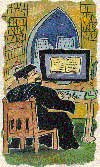On frets about the death of the book
A Counterargument I Made Back in '97
Back in the heyday of claims about “the Internet revolution” — I’d say 1997 was a peak year — there was naturally a backlash. I sympathized a little bit with the backlashers, since so many people who knew nothing about computing and information technology participated in the hype. But mostly I did not sympathize. In ’96 or so I was asked to write a short review of Barry Sanders’s A is for Ox: Violence, Electronic Media, and the Silencing of the Written Word (Pantheon, 1994) and I used it as my chance to respond to those who fretted about the impending demise of the book. (I knew Barry a bit from our days researching together at the Huntington Library and actually — from those good conversations in which he seemed no troglodyte — I was surprised when reading his book how much I disagreed with him.) Here are the first two paragraphs of the review (the rest can be found here):
 Some anxieties become merely historical. One is surely Barry Sanders’s. His book A is forOx: Violence, Electronic Media, and the Silencing of the Written Word (Pantheon, 1994) is full of worries that the flow of data across the screen is replacing the cozy curl in the armchair — frets about the death of the book. I’m not really much concerned with the problem of making a rejoinder to Sanders, or to Sven Birkerts, whose book The Gutenberg Elegies: The Fate of Reading in an Electronic Age (Faber, 1995) eloquently joins the trend of English profs become anti-computing Jeremiahs. I’m more concerned, actually, with the way in which the logic of Sanders and Birkerts and others affects our thinking about universities at a critical moment when teaching, the intellectual relation of teacher to student, and basic university structures, can dramatically change for the better if we take a few conceptual cues from the information age. The parallels between the two situations — how electronic media alter the book and how they alter education — will have to remain somewhat implicit here, for lack of space. (But, partly to prove my point, I invite discussion of the animated sort these printed pages won’t enable; see below.)
Some anxieties become merely historical. One is surely Barry Sanders’s. His book A is forOx: Violence, Electronic Media, and the Silencing of the Written Word (Pantheon, 1994) is full of worries that the flow of data across the screen is replacing the cozy curl in the armchair — frets about the death of the book. I’m not really much concerned with the problem of making a rejoinder to Sanders, or to Sven Birkerts, whose book The Gutenberg Elegies: The Fate of Reading in an Electronic Age (Faber, 1995) eloquently joins the trend of English profs become anti-computing Jeremiahs. I’m more concerned, actually, with the way in which the logic of Sanders and Birkerts and others affects our thinking about universities at a critical moment when teaching, the intellectual relation of teacher to student, and basic university structures, can dramatically change for the better if we take a few conceptual cues from the information age. The parallels between the two situations — how electronic media alter the book and how they alter education — will have to remain somewhat implicit here, for lack of space. (But, partly to prove my point, I invite discussion of the animated sort these printed pages won’t enable; see below.)
For Barry Sanders, computers are intellectually fascistic. He thinks that when young people read books, as opposed to electronic text, they experience a kind of authority (the author’s) that is engaging and not forbidding — entreating interaction. Horrified, he imagines that when a “young person … enters into an electronic world, [it is] one in which the rules are immutable and pre-established. … He or she comes to know that authority, real knowledge, and skill, reside in the machine, dictated by an anonymous disembodied programmer. … Authority resides in the book as well. But it is authority, not technological ukase.” This so completely mistakes electronic text that one hardly knows where to begin. Sanders is wrong about the relationship between the authority of the programmer and the individual reader of e-text. If anything, authority is both more transparent and more effectively open to response in the new media for reading and learning than in the context of print — and here is where we might conceive of a powerful author-reader/teacher-learner relation for the near future.
And my final paragraph:
Authors and teachers have as a new tool a kind of text that can “meander” by virtue of its form as well as its content, literally urging the reader to make choices at every turn. To the extent that we can resist the easy characterization of this mode of reading and learning as inhuman and “dictatorial” — with its anxious view of cultural authority as residing not in the individual creator of text but in the creator of the system syntax — then, I think, we will be better able to face a few of our problems as educators.
I suppose in those days I was sometimes accused of participating in the hype. I went around the country giving a lecture called “The End of the Lecture” (paid well to do so). Yet I do believe we should and will see the end of the lecture as we know it. More on that in some later post. Meantime, do watch a short version of that talk that was videotaped as part of Val Ross’s “60-second lecture” series: here.